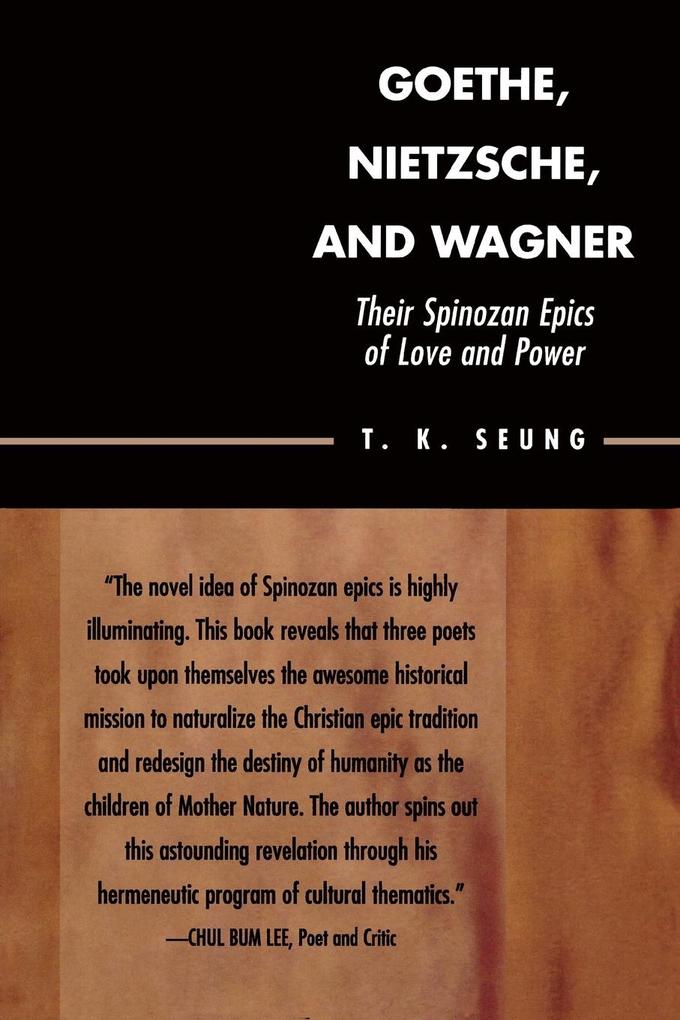
Zustellung: Fr, 27.06. - Di, 01.07.
Versand in 6 Tagen
VersandkostenfreiBestellen & in Filiale abholen:
The author reads Goethe's Faust as the first epic written under Spinoza's influence. He shows how its thematic development is governed by Spinoza's pantheistic naturalism. He further contends that Wagner and Nietzsche have tried to surpass their mentor Goethe's work by writing their own Spinozan epics of love and power in The Ring of the Nibelung and Thus Spoke Zarathustra. These Spinozan epics are designed to succeed the Christian epics in the Western literary tradition. Whereas the Christian epics dared to groom human beings for their destiny in the supernatural world, the Spinozan epics try to reinstate humanity as the children of Mother Nature and overcome their alienation from the natural world, which had been dictated by the long reign of Christianity. However, it has been well noted that none of these new epics seems to hang together thematically as a coherent work. By his Spinozan reading, the author not only demonstrates the thematic unity of each of them singly, but further illustrates their thematic relation with each other.
Produktdetails
Erscheinungsdatum
04. April 2006
Sprache
englisch
Seitenanzahl
402
Autor/Autorin
T. K. Seung
Verlag/Hersteller
Produktart
kartoniert
Gewicht
650 g
Größe (L/B/H)
229/152/24 mm
ISBN
9780739111284
Entdecken Sie mehr
Pressestimmen
This broad-gauged study is full of engaging and original ideas. The grand itinerary of thought once again displays Seung's characteristic erudition, clarity of argument, and spiritual engagement. It is exactly the sort of book that one wants to read closely, learn from appreciatively, and engage in intense critical debate. -- Stanley Corngold, Professor of German Literature, Princeton University This ambitious book traces the thread of Spinozism that connects three monuments of European modernity. The author interprets these works as epics of love and power in the Spinozan world. His bold thesis and lucid prose will appeal to students and scholars of philosophy, literature, religion, and European culture. -- Daniel Conway, Professor of Philosophy, Pennsylvania State University The author has a genius for discovering and mapping paths of thought relating the greatest minds of our heritage. In The Fragile Leaves of the Sibyl, he illuminated Dante's master plan by proposing the original and compelling thesis that the Divina Commedia is an allegorical representation of the Holy Trinity as its epic hero. In Nietzsche's Epic of the Soul, he showed how Spinoza's idea of an immanent God had infused Nietzsche's thought. Now in this book, he deepens our understanding of Goethe, Nietzsche, and Wagner in their poetic renditions of Spinoza's daring vision for human destiny. -- John Silber, University Professor and President Emeritus, Boston University The novel idea of Spinozan epics is highly illuminating. This book reveals that three poets took upon themselves the awesome historical mission to naturalize the Christian epic tradition and redesign the destiny of humanity as the children of Mother Nature. The author spins out this astounding revelation through his hermeneutic program of cultural thematics. -- Chul Bum Lee, Poet and critic [An] ambitious and attractively pugnacious study...Seung writes lucidly, engagingly, and with a rewarding attention to unremarked interpretive possibilities. Journal Of Germanic Studies, September 2008 This fresh interpretation of Goethe's Faust sheds new light on Germany's literary monument. Never before has this work been analyzed so consistently with Spinoza's pantheism as its guiding thought and driving force. The result is a rich and penetrating treatment of the epic hero Faust from a relentlessly striving, often ruthlessly egocentric figure to a human being who discovers his communal self at the end of his life. Students of German literature are in for a number of surprises. The most startling of them all is the bold move to read the ending of Faust II not as a problematic, pseudo-Christian melodrama with the hero's soul on its way to heaven, but as a psychodrama within Faust just before his death. There is plenty in Seung's engaging study to disagree with, but he never presents a weak case, and to wrestle with his arguments is always rewarding. -- Walter Wetzels, Professor Emeritus of German Literature, University of Texas
Bewertungen
0 Bewertungen
Es wurden noch keine Bewertungen abgegeben. Schreiben Sie die erste Bewertung zu "Goethe, Nietzsche, and Wagner" und helfen Sie damit anderen bei der Kaufentscheidung.









